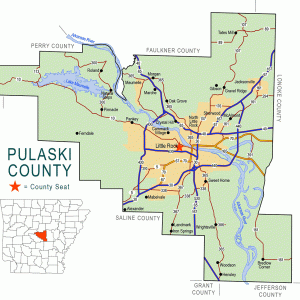calsfoundation@cals.org
Morgan (Pulaski County)
Morgan is an unincorporated settlement in northern Pulaski County. It is located on State Highway 365 (also known as MacArthur Drive) between Maumelle (Pulaski County) and Camp Joseph T. Robinson. Most people who travel through Morgan do not even know that they have been there.
The origins of the name of Morgan are unknown, particularly since it never had a post office or a railroad depot. The earliest use of the land around Morgan was as a cemetery, called Palarm Bayou Pioneer Cemetery, which was added to the National Register of Historic Places in 2005. Several citizens of Little Rock (Pulaski County) are buried there, including Daniel E. Wilson, buried in 1837, and John Ferguson, buried in 1886. Wilson, a businessman and sometime politician, had come to Little Rock from Kentucky in the 1820s, was on the board of trustees for Little Rock, was a partner in establishing the Eagle Hotel, and operated a toll bridge in Palarm (then part of Pulaski County, but now in Faulkner County).
George Day and David Martin received land patents west of Morgan in 1831 and 1832, respectively. After the Civil War, John Q. Rice acquired a land patent for part of Morgan in 1877, and Dickey Nelson became his neighbor in 1890. Construction of the Little Rock and Fort Smith Railroad, beginning in 1869, passed through Levy (Pulaski County) and Marche (Pulaski County) but missed Morgan by about two miles. In 1917, the U.S. government acquired 6,480 acres of land south of Morgan to build Camp Pike, a training ground for World War I soldiers. During the Depression, a Civilian Conservation Corps (CCC) camp used the land. In 1937, Camp Pike was renamed for U.S. senator Joseph Taylor Robinson of Arkansas. During World War II, American troops again trained there, and German prisoners of war were housed there. After the war, Camp Robinson became the home of Arkansas’s National Guard.
Also during World War II, an ordnance plant was built south of Morgan. The entrance to the plant was on Highway 365 at the northern end of Morgan. When the plant was no longer needed following the conclusion of the war, the land was acquired by Perry Equipment Company, which later sold the land to the City of North Little Rock (Pulaski County), whose leaders proposed to develop an industrial park at that location. When that plan failed to materialize, the land was purchased by Jesse P. Odom, who developed the city of Maumelle in the 1970s. By that time, Interstate 40 had been built, separating Morgan from the new city of Maumelle.
A rest area for interstate travelers opened near Morgan in 1973. The rest stop was closed in 1992 after a year of controversy during which the location was described as a meeting place for homosexual men. The Pulaski County Sheriff’s Department made several arrests at the rest stop in 1991 and later revealed that they had used a hidden camera in the men’s bathroom of the rest stop to gather evidence to justify their arrests. The problem of vandalism and the cost of maintaining the property were also cited as reasons for the closing.
Construction of a housing development named Mountain Crest early in the twenty-first century revealed the existence of the forgotten nineteenth-century cemetery. Morgan consists mainly of houses, although it also contains an RV park and two churches. Motels and other businesses built at the interchange of Highway 365 and Interstate 40 are generally associated with Maumelle, not with Morgan.
For additional information:
Goff, April. “Palarm Bayou Cemetery, Pulaski County, Arkansas.” Arkansas Family Historian 43 (September 2005): 124–130.
“Palarm Bayou Pioneer Cemetery.” National Register of Historic Places Nomination Form, Arkansas Historic Preservation Program. http://www.arkansaspreservation.com/National-Register-Listings/PDF/PU8172.nr.pdf (accessed October 6, 2021).
Thompson, Brock. The Un-Natural State: Arkansas and the Queer South. Fayetteville: University of Arkansas Press, 2010.
Steven Teske
Butler Center for Arkansas Studies
 Pulaski County Map
Pulaski County Map 




Comments
No comments on this entry yet.